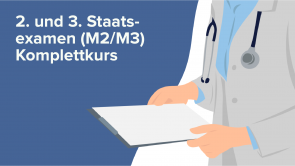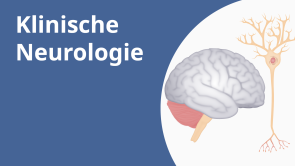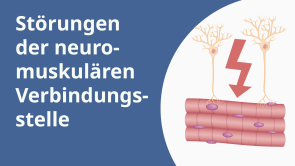Myasthenia gravis: Klinische und serologische Tests – Diagnose

Über den Vortrag
Der Vortrag „Myasthenia gravis: Klinische und serologische Tests – Diagnose“ von Roy Strowd, MD ist Bestandteil des Kurses „Störungen der neuromuskulären Verbindungsstelle“.
Quiz zum Vortrag
Muscle contraction is the final result of what activity in the sarcolemmal membrane initiated by recognition of acetylcholine by the AcH receptors?
- An influx of sodium into the muscle cell
- An influx of acetylcholine into the muscle cell
- An influx of potassium into the muscle cell
- An influx of calcium into the muscle cell
- An efflux of chloride ions out of the muscle cell
Which of the following best describes the function of the MuSK enzyme?
- It is a docking enzyme for the acetylcholine receptor that can be disrupted in some forms of myasthenia gravis.
- It is a subtype of the acetylcholine receptor that is directly stimulated by acetylcholine.
- It is an enzyme responsible for the degradation of acetylcholine receptors.
- It is a SNARE protein involved in the release of acetylcholine into the synaptic cleft.
- It is an enzyme that can cause a false-positive VDRL/RPR.
Which of the following statements about myasthenia gravis serologic testing is true?
- Patients who are anti-MuSK Ab positive have a smaller chance of remission than AChR Ab-positive patients.
- Anti-MuSK Ab are present in about 80% of myasthenics.
- AChR Ab are more commonly associated with ocular findings without systemic complaints.
- Anti-MuSK Abs are present in over 50% of patients with AChR Ab-negative testing.
- AChR Ab-positive patients have a 50% chance of remission.
Which of the following is not a characteristic finding in myasthenia gravis?
- Muscle weakness is exacerbated by the ice pack test.
- There is a decrement in muscle contraction with repetitive stimulation measured by EMG/NCV.
- Anti-striational antibodies are present with a thymoma.
- The symptoms are reversed with the edrophonium test.
- There is "jitter" on single-fiber EMG.
Diese Kurse könnten Sie interessieren
Kundenrezensionen
5,0 von 5 Sternen
| 5 Sterne |
|
5 |
| 4 Sterne |
|
0 |
| 3 Sterne |
|
0 |
| 2 Sterne |
|
0 |
| 1 Stern |
|
0 |






